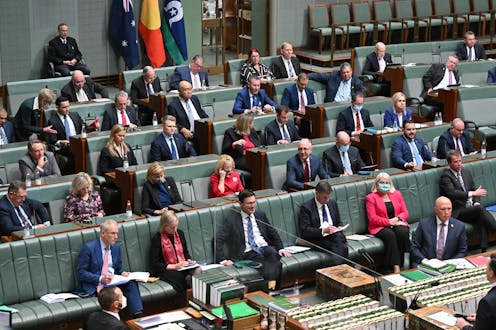
The Liberal Party’s review of its election rout has highlighted the party’s broad and deep problem with the female vote, but shied away from recommending quotas to elect more women.
Like Labor’s recent post-mortem, the Liberal analysis also points to the key importance of voters’ negative perceptions of Scott Morrison in his government’s election loss.
Prepared by former party director Brian Loughnane and senator Jane Hume, the Liberal report, released today, presents a stark picture of extensive political and organisational failure.
“Put simply, by the time of the election the Coalition had lost control of its brand,” the report says. “We were not in control of the politics, and we were unable to frame the electoral contest.”
Morrison’s “standing with voters deteriorated significantly through 2021 to become a significant negative. The Prime Minister and the Party were seen as ‘out of touch’.
"The leadership choice between Scott Morrison and Anthony Albanese became the most influential driver of voting intention during the campaign period.”
In the year before the election, “there was a loss of political capital and an accumulation of negative issues” for the government.
These included lost political focus due to the demands of the pandemic; allegations of the poor treatment of, and attitude toward, women; scandal, disunity and instability in the government; the government’s longevity and its lack of a clear forward agenda; and faults of state divisions of the party.
To rebuild, the report says, the Liberals must establish a “strong, grassroots presence”, state executives must act in the party’s electoral interests, the parliamentary team must be united and disciplined, and campaigning must be significantly improved.
In an important message as the party struggles against not just Labor but the new “teal” wave, the review declares the Liberals mustn’t give up on any of the seats lost to the teals in May. It also warns teal candidates could threaten other seats in future.
Surveying the Liberals’ current parlous electoral position, the review says: “The Party has lost nearly all of its inner metropolitan seats: 13 seats lost, 6 to Labor, 5 to Teal, 1 to Green, and 1 to redistribution. The Coalition now holds 4 [of the 44 inner metropolitan seats].
"The Party has not held or provided any gains in outer metropolitan seats: 5 seats lost; 3 to Labor, 1 to Teal, 1 to Green. The Coalition now holds 16.
"Of particular concern in the results is that in seats with high numbers of female professional voters, the Liberal Party only holds three of the top 30 seats where previously it held 15. In the top 50 seats by female professionals, the Liberal Party only holds 10 seats where previously it held 25.”
Overall, the party “performed particularly poorly with female voters, continuing a trend that has been present since the election of 1996”.
A majority of women preferred Labor across all age segments, the report says.
The Liberals’ two-party preferred vote was the weakest among women aged 18-34. Women aged 35-54 were the most likely segment to move from the Liberals, and women in this age group were the most likely segment to vote independent.
“Liberal defectors in Teal seats were highly likely to agree with the statement that ‘the treatment or attitude toward women within the Liberal Party had a strong influence on my vote’.”
The review says that if the Liberal party “is to fully reflect the Australian community the objective must be to improve the level of female members, particularly younger women, and to increase the level of representation of women as successful members of parliament, not just as candidates.
"The Party must therefore ensure that all Divisions are working to increase female membership, particularly of women under 50. The Party must also ensure there is a much larger number of high-quality female candidates contesting key, winnable seats at the next election.
"It is expected that by broadening the membership base with young women, and retaining them, that this will assist in identifying strong pre-selection candidates.”
The review recommends a target of 50% female representation in the party’s parliamentary ranks within ten years or three terms.
But it does not suggest imposing quotas for female candidates or MPs, as Labor has. There have been calls from some Liberals for quotas, but also strong resistance within the party to having them.
Read more: The Morrison government spent a record amount on taxpayer-funded advertising, new data reveal
Urging a robust fightback against the teals, the report says: “The Party must concede no seat and must vigorously contest the Teal seats at the next election.
"This will require the strongest possible candidate in each seat and a rebuilding of the Party infrastructure in each seat. It will also require specific strategies for each seat,” it says.
“The Liberal Party must monitor Teal statements and commitments as they will be the basis for future candidates campaigning against Teal incumbents.
"In addition, public comments by Teal campaign leaders are foreshadowing the possibility of Teal campaigns in additional seats currently held by the Coalition at the next election.
"The Party should be conscious of candidates as they are announced and work with Liberal incumbents to develop plans to counter these future candidates’ campaigns.”
The review recommends that for teal seats, the party begins searching early for possible candidates with strong community credentials.
The review urges action to win back the support of Chinese-Australians, who swung against the Morrison government. It recommends the parliamentary party should “develop an outreach programme for Party MPs and Senators to [culturally and linguistically diverse] communities, in particular the Chinese Australian community” as well as reviewing “the need for the appointment of additional staff with bilingual language skills”.
Michelle Grattan does not work for, consult, own shares in or receive funding from any company or organisation that would benefit from this article, and has disclosed no relevant affiliations beyond their academic appointment.
This article was originally published on The Conversation. Read the original article.







